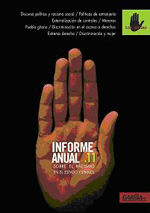Spain: Traditional parties encourage racism and xenophobia
Published on Fri, 2011-07-08 09:07
Sources (in Spanish): SOS Racismo, El Comercio, Ecuador, EFE, at Mugak, Cadena SER. Racism and xenophobia have intensified in Spain under the influence of political forces and traditional parties that have assumed postulates until now restricted to the extreme right, warned the federation of non-governmental organizations SOS Racismo in its latest annual report. In recent months, “a time bomb” has been created, while “the political class fails as a whole; ones for playing the racist game and others for not condemning it enough”, said Alba Cuevas, the spokeswoman for the network in Cataluña. As a specific example to support this statement, SOS Racismo referred to the refusal of town councils in Cataluña to allow irregular inmigrants to exert basic rights such as registering on municipal rolls, which has contributed to the criminalization of foreigners. Even in municipalities where the use of Burqas was never detected, a ban on this clothing was proposed. This discourse, together with the aggravation of the economic crisis, has translated into an intensification of xenophobic attitudes and opinions. The Bertelsmann Foundation verified that 31 per cent of the Spanish population would expel immigrants that have been unemployed for a long time. A clear cut in social rights for inmigrants has also been registered, which increases the vulnerability of a group that is already subjected to a special, and many times discriminatory, regulation. Immigrants in Spain are a group showing relative stability. According to the Ministry of Labour, by the end of 2010 the figure of foreign residents was very similar to that of the previous year: 4,926,608 people. The community regime (48.75 per cent) is practically the same as the general regime for foreigners -non-community (51.25 per cent). Notwithstanding this, inmigrants continue to have an unemployment rate ten points higher than that of the native population. Furthermore, the report by SOS Racismo detected a reduction in the arrival of people in irregular situation, owing to the economic crisis and the change of route of migratory flows. This reduction, however, does not alleviate the tragedy involved in the attempt of reaching the Spanish coasts, which in 2010 – according to APDHA data – resulted in the death of 131 people. This survey indicates that 2,738 people had access to asylum procedures last year in Spain, nearly 6 per cent less than in 2009, the lowest figure since 1989. It also confirmed the existence of discriminatory actions in the work sphere and in relation to security forces, where an halo of impunity can be noticed. The stigmatization and persecution of gypsies – transmitted by France to its neighbours – led the Popular Party (PP) to criminalize the Roma from Eastern Europe in Badalona. Spanish political parties “have broken the ethical barrier by charging foreigners and minorities with accusations, expressions and actions that are even categorized as crimes”, warned Alba Cuevas. “The populist discourse” and taking advantage of the “economic crisis to create fear, appealing to emotion, to the concept of survival, to the classical motto ‘primero los de casa’ (natives first!)” is gaining ground not only hand in hand with the extreme right but owing to the fact that “major political parties, such as the PP in Badalona and national representatives that fail to unauthorize the discourse of the Mayor of the third Catalan city (Badalona), are playing the racist game”, without condemning these practices, according to Cuevas. “The idea that if there is not enough for everybody, natives are first, particularly in terms of health, education or basic services, is being increasingly accepted”, explained the report’s coordinator, Mikel Mazkiaran, during its presentation.
|
SUSCRIBE TO OUR NEWSLETTER



